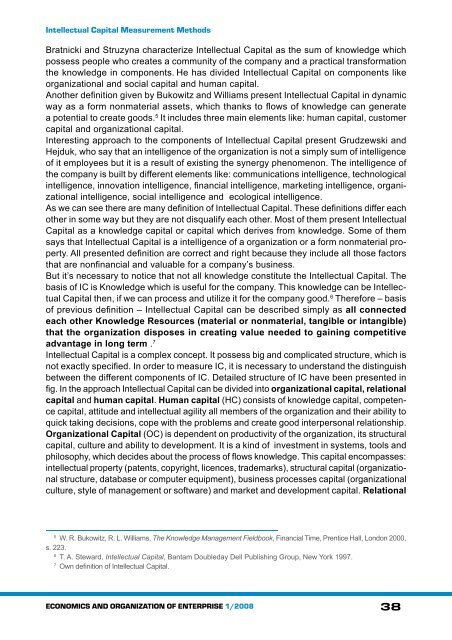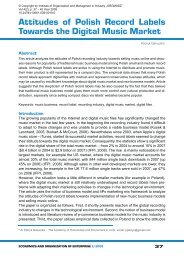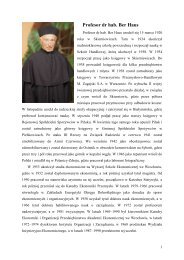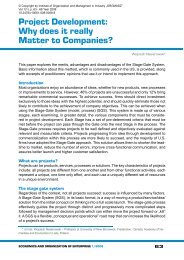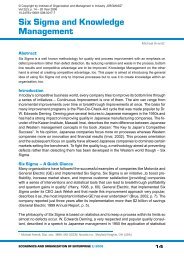Intellectual Capital Measurement Methods
Intellectual Capital Measurement Methods
Intellectual Capital Measurement Methods
Create successful ePaper yourself
Turn your PDF publications into a flip-book with our unique Google optimized e-Paper software.
<strong>Intellectual</strong> <strong>Capital</strong> <strong>Measurement</strong> <strong>Methods</strong><br />
Bratnicki and Struzyna characterize <strong>Intellectual</strong> <strong>Capital</strong> as the sum of knowledge which<br />
possess people who creates a community of the company and a practical transformation<br />
the knowledge in components. He has divided <strong>Intellectual</strong> <strong>Capital</strong> on components like<br />
organizational and social capital and human capital.<br />
Another definition given by Bukowitz and Williams present <strong>Intellectual</strong> <strong>Capital</strong> in dynamic<br />
way as a form nonmaterial assets, which thanks to flows of knowledge can generate<br />
a potential to create goods. 5 It includes three main elements like: human capital, customer<br />
capital and organizational capital.<br />
Interesting approach to the components of <strong>Intellectual</strong> <strong>Capital</strong> present Grudzewski and<br />
Hejduk, who say that an intelligence of the organization is not a simply sum of intelligence<br />
of it employees but it is a result of existing the synergy phenomenon. The intelligence of<br />
the company is built by different elements like: communications intelligence, technological<br />
intelligence, innovation intelligence, financial intelligence, marketing intelligence, organizational<br />
intelligence, social intelligence and ecological intelligence.<br />
As we can see there are many definition of <strong>Intellectual</strong> <strong>Capital</strong>. These definitions differ each<br />
other in some way but they are not disqualify each other. Most of them present <strong>Intellectual</strong><br />
<strong>Capital</strong> as a knowledge capital or capital which derives from knowledge. Some of them<br />
says that <strong>Intellectual</strong> <strong>Capital</strong> is a intelligence of a organization or a form nonmaterial property.<br />
All presented definition are correct and right because they include all those factors<br />
that are nonfinancial and valuable for a company’s business.<br />
But it’s necessary to notice that not all knowledge constitute the <strong>Intellectual</strong> <strong>Capital</strong>. The<br />
basis of IC is Knowledge which is useful for the company. This knowledge can be <strong>Intellectual</strong><br />
<strong>Capital</strong> then, if we can process and utilize it for the company good. 6 Therefore – basis<br />
of previous definition – <strong>Intellectual</strong> <strong>Capital</strong> can be described simply as all connected<br />
each other Knowledge Resources (material or nonmaterial, tangible or intangible)<br />
that the organization disposes in creating value needed to gaining competitive<br />
advantage in long term . 7<br />
<strong>Intellectual</strong> <strong>Capital</strong> is a complex concept. It possess big and complicated structure, which is<br />
not exactly specified. In order to measure IC, it is necessary to understand the distinguish<br />
between the different components of IC. Detailed structure of IC have been presented in<br />
fig. In the approach <strong>Intellectual</strong> <strong>Capital</strong> can be divided into organizational capital, relational<br />
capital and human capital. Human capital (HC) consists of knowledge capital, competence<br />
capital, attitude and intellectual agility all members of the organization and their ability to<br />
quick taking decisions, cope with the problems and create good interpersonal relationship.<br />
Organizational <strong>Capital</strong> (OC) is dependent on productivity of the organization, its structural<br />
capital, culture and ability to development. It is a kind of investment in systems, tools and<br />
philosophy, which decides about the process of flows knowledge. This capital encompasses:<br />
intellectual property (patents, copyright, licences, trademarks), structural capital (organizational<br />
structure, database or computer equipment), business processes capital (organizational<br />
culture, style of management or software) and market and development capital. Relational<br />
5<br />
W. R. Bukowitz, R. L. Williams, The Knowledge Management Fieldbook, Financial Time, Prentice Hall, London 2000,<br />
s. 223.<br />
6<br />
T. A. Steward, <strong>Intellectual</strong> <strong>Capital</strong>, Bantam Doubleday Dell Publishing Group, New York 1997.<br />
7<br />
Own definition of <strong>Intellectual</strong> <strong>Capital</strong>.<br />
ECONOMICS AND ORGANIZATION OF ENTERPRISE 1/2008<br />
38


